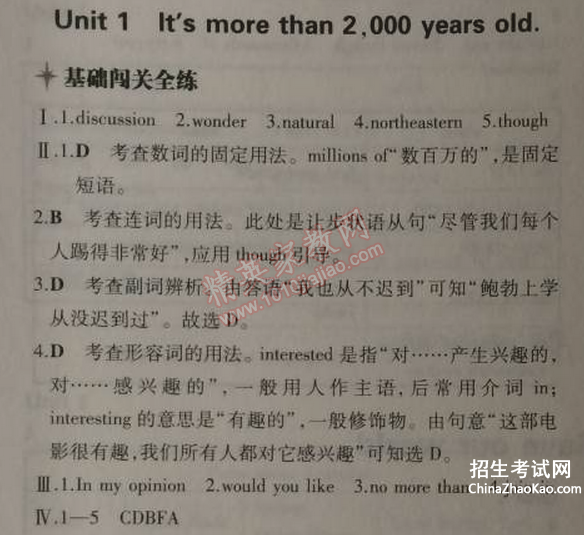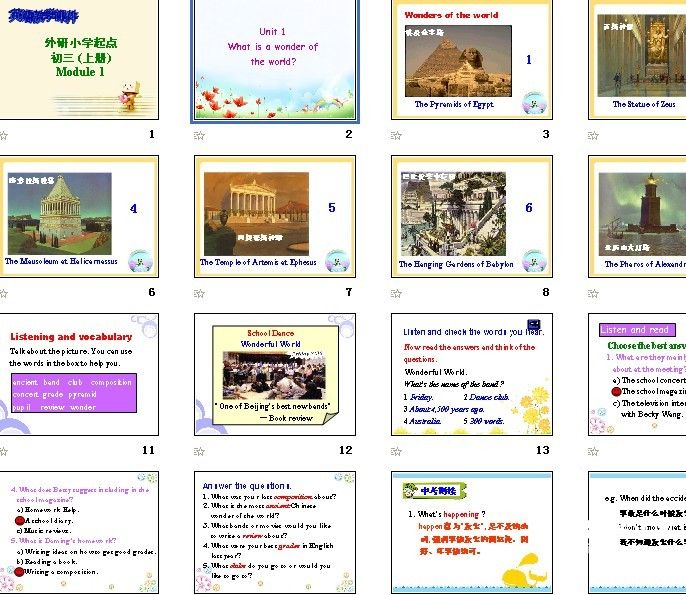【www.guakaob.com--翻译】
Module1 Wonders of the world
Unit 1 It’s more than 2,000 years old.
Listening and vocabulary
1. Match the names of the wonders with the pictures on the right and on the next page.
a) The Terracotta Army
c) The Three Gorges Dam
the box to help you. b) The Giant’s Causeway d) Victoria Falls 2. Look at the pictures and answer the questions. Use the words in
1. Which two are natural wonders?
2. Which two are man-made wonders?
3. Which is an ancient wonder?
4. Which is a modern wonder?
Now Listen and check
3. Listen and read
Tony: Let's call Wonders of the World and join in the discussion. I think
natural wonders are more interesting than man-made ones. And I think the Giant's Causeway is the most fantastic natural wonder. Lingling: Hm, I’ve never seen it, so I'm not sure I agree with you. Why do
you like it, Tony?
Tony: Well, I visited the Giant's Causeway two years ago. It's huge.
There're about 40,000 rocks, most of them with six sides. It goes for several hundred metres on the eastern coast of Northern Ireland Lingling: That sounds great, though I think Victoria Falls in Africa are even
more fantastic. They're about l,700 metres wide and 100 metres high. You can hear the loud noise a few kilometres away.
Betty: Wow, that's huge! But in my opinion, man-made wonders are more
exciting than natural ones. Look at the Terracotta Army. It's more than 2.000 years old.
Daming: I agree with you, Betty. And I think the Three Gorges Dam is
fantastic too. It's about 2,300 metres long, 185 metres high and 15
metres wide at the top. It produces electricity for millions of
people in China.
Betty: Now, who'd like to call first?
Now check (√) the true sentences
1. Tony thinks the Giant’s Causeway is the largest natural wonder.
2. Lingling thinks Victoria Falls are more fantastic than the Giant’s Causeway.
3. Betty and Daming are more interested in man-made wonders
4. For Daming, the Three Gorges Dam is more fantastic than the Terracotta Army.
4. Answer the questions.
1. Where is the Giant’s Causeway?
2. How wide are Victoria Falls?
3.What wonders does Betty think are more exciting?
4. How old is the Terracotta Army?
5. Complete the sentences with the words in the box.
discussion eastern huge opinion though
1. In my _______, natural wonders are more interesting than man-made ones.
2. Victoria Falls, about 1,700 metres wide and 100 metres high, are_______
3.Let’s join in the _____________about the wonders of the world.
4. I think the Giant’s Causeway on the ________coast of Northern Ireland is
a fantastic natural wonder.
5. To some degree, Lingling agrees with Tony about the Giant’s Causeway,
______she thinks Victoria Falls are more fantastic.
Pronunciation and speaking
6. Listen and mark the pauses.
1.I’ve never seen it, so I’m not sure I agree with you.
2. That sounds great, though I think Victoria Falls in Africa are even more
fantastic.
3. In my opinion, man-made wonders are more exciting than natural ones. Now listen again and repeat.
7. Work in pairs. Make a list of wonders of the world. Say which one
you would like to visit and why.
--- Which wonder of the world would you like to visit?
--- I’d like to visit the Giant’s Causeway because I love wild places by the sea.
Module 1 Wonders of the world
Unit 1: It’s more than 2000 years old.
托尼:我们给《世界奇观》节目打电话,加入讨论吧。我觉得自然奇观比人造奇观更有趣。而且我认为巨人之路是最神奇的自然奇观。
玲玲:嗯,我没有见过巨人之路,所以我不知道该不该同意你的看法。你为什么会喜欢它呢,托尼?
托尼:哦,两年前我浏览了巨人之路。它非常大,由大约4万多块石块组成,大多数石块都有六个面。巨人之路位于北爱尔兰东海岸,绵延数百米。
玲玲:听起来很神奇,但我认为非洲的维多利亚瀑布更壮观。瀑布宽约1700米,高约100米,数千米之外就能听到瀑布的巨响。
贝蒂:哇!那么大啊!但是,在我看来,人造奇观比自然奇观更激动人心。就说兵马俑吧,它们都有两千多年的历史了。
大明:我同意你的看法,贝蒂。我觉得三峡大坝也很神奇。大坝长约2300米,高185米,顶部宽15米。它为中国数百万的人口供电。
贝蒂:那现在谁来拨打热线?
Unit 2 The Grand Canyon was not just big .
自然界的一大奇观
我到那里时是大清早,天下着雨。我朝东边看了看,天空变得灰蒙蒙的。我下了车,穿过一道门,沿着一条黑暗的小路前行。虽然什么也看不见,但我知道它就在那里。
大约走了一英里,小路边出现了一个陌生人。我问道:“我走的路对吗?”他知道我要去哪里。他答道:“对,五分钟后你就能到达那里。”终于,我走到一些岩石前停了下来。我朝那片岩石望过去,但是一片寂静,还是看不见它。
突然,雨停了,云散了。太阳从我身后升起,照在岩石上。地面(仿佛在随着光线)向下延伸,(逐渐)退落到下面的一条河里。我在眺望着这自然界奇观之一的大峡谷。
我俯视着距我一英里之遥的银色的科罗拉多河。即使你把世界上最高的两栋建筑物叠在一起放在谷底,它们仍就到不到了顶。然后我眺望峡谷的另一边。它大约在15英里之外,也许更远。最后,我向左右遥望,大峡谷向两边延伸, 长达200多英里。大峡谷不仅仅是大,而是巨大!
我在大峡谷伫立半小时有余,我问了自己一个问题:“大峡谷是自然界中最壮观的奇观吗?”我心中自然已有答案。你怎么认为呢?
Module 2 Public holidays
Unit 1 My family always go somewhere interesting as soon as the holiday begins.
托尼: 玲玲, 10月1日是中国的国庆节,对吗?
玲玲: 是的。 中华人民共和国成立于1949年10月1日。从那时开始,中国人(每年)都庆祝国庆节。(国庆节时)到处都有鲜花和国旗,我们休假3天。
托尼: 这个国庆假期你有什么计划吗?
玲玲: 有。我和爸爸妈妈准备去山东省拜访一些朋友。我们会一直待在那里,直至假期结束。和朋友们在一起期间,我们会去青岛玩一天。贝蒂,你们的国庆节是什么时候呀?
贝蒂: 我们的国庆节叫独立日,在7月4日。从1777年以来,我们一直庆祝这个节日。独立日是一个公共假日,但我们只放一天假。那一天有各种各样的节日活动。这个时间是休假季节的开始,大多数人都会在七月或八月的某段时间休假。
玲玲: 那天有什么特别的事情吗?
贝蒂: 嗯,到处都可以看到美国国旗。我们通常会去一些好地方野餐。孩子们玩得可开以了。我们也可以在公园里观看乐队演奏乐曲。
大明: 托尼,你们英国也过国庆节吗?
托尼: 不,我们没有。我们放假两天庆祝圣诞节。假期一开始,我们一家就会去某人好玩的地方。
Unit 2 We have celebrated the festival since the first pioneers arrived in America .
感恩节
感恩节是美国的一个节日。人们在每年十一月的第四个星期四庆祝它。它是家人和朋友共进特殊晚餐的时刻。人们发表简短的致辞,为食物而感恩。
自首批来自英格兰的拓荒者在17世纪乘船抵达美洲大陆以来,我们就一直庆祝这个节日。在横渡大西洋时,他们当中的许多人都死在途中。到达美洲后,他们所渡过的第一个冬天比英国以往的任何一个冬季都要恶劣。当地人,也就是美洲印第安人,教这些拓荒者们如何种植玉米。第二年,他们聚在一起品尝新收获的食物,一起欢庆丰收。
今天我们仍然用传统的晚餐庆祝感恩节。厨房总是我们家最拥挤的房间,因为我们都帮着准备晚餐。我们摆放餐具,晚餐开始前,我父亲感谢食物,我们用这样的方式在记住我们为什么庆祝这个节日。我们通常会吃很多,毕竟一年只有一次!晚餐后我们经常谈论很多,也讲故事。当这些都结束后,所有人都帮着洗餐具。
这个节日是旅行非常频繁的时候,因为这个时候朋友、家人都相聚来庆祝节日。在节日期间还有很多其他可看可做的事情。我们住在纽约市,所以去观看梅西感恩节大游
行。大游行沿着几条街道进行,在著名的梅西百货公司结束。感恩节是圣诞季的开始,我们开始逛街购买礼物。足球在感恩节也是重要的,因为有许多球队进行比赛。和许多美国人一样,我们通常在电视上观看比赛,尽享乐趣。
Module 3 Heroes
Unit 1 She trained hard, so she became a great player later.
李老师: 大明,谁是你的英雄?你要选择谁来讲述呢?
大明: 邓亚萍!她是我的英雄,因为她是世界上最棒的乒乓选手之一,而且我喜欢打乒乓球。
李老师: 那就给我们讲讲她!
大明: 嗯,她五岁开始练球。她训练刻苦,所以后来成了一名伟大的乒乓球选手。
李老师: 她赢过哪些比赛呢?
大明: 她获得过许多次世界冠军,包括四枚奥运会金牌。她24岁时退役。
李老师:后来她做了什么呢?她开始在北京读清华大学,后来到国外大学深造。刚开始的时候,她的英语并不好,她还是刻苦努力,7年后,她获得了剑桥大学的博士学位。她无论做什么,都不放弃。
Module One Wonders of the wonders
主备人:孙瑞霞 审核人:英语组
Unit 1. It’s more than 2,000 years old.
学习目标:
1、知识和技能目标
1).话题: Wonders of the world.
2)语音:能够根据意群正确地断句。
3)词汇:学会正确使用本单元单词。
4)语法:熟练掌握并运用英语六大时态。
5)功能:能够围绕模块话题进行交流。
2、技能目标 :1.能够听懂与话题相关的对话并获取信息。
2.能够运用六种时态,围绕话题进行交流。
3、学习策略:学会预习,学会合作。
4、情感、态度和价值观目标:培养对神奇大自然的热爱及对伟大人类文明的热爱。 学习重点: 熟练掌握并运用英语六大时态。
学习难点:熟练掌握并运用英语六大时态。
学法指导:1.课前通过自学单词和预习课文,解决学案中的问题。
2.课上通过合作探究、展示交流,解决重难点。
3.课后自我总结归纳。
一、课前预习导学 :
(一)根据汉语写单词并在课文中划出这些单词:
名词(n.)奇观;奇迹__won der__ 讨论______________ 电______________【九年级上册英语m1u1课文翻译wonders,of,the,world】
人造的___________大自然的___________东方的___________响亮的___________ 连接词(ink.) 尽管______________adj. 在东边的; 来自东边的
_________ adj. __________ 按某人的意见;根据某人看
__________ (不) 确定 _________ 成千上万的; 无数的
完成Activity 1 and 2 (小组内订正答案)
(二)朗读本单元课文三遍,把你认为重要的句子和不理解的句子写在下面,你能划出重要或不理解的地方吗?
——————————————————————————————————————————————————————————————————————————————————————————————————————————————————————————————————————————————————————————————————————————————————
(三)一听:
1.What are they talking about?
A. Travelling B. Wonders C. Programme
2.How many wonders ____________are mentioned in the dialogue?
A. Six B. Five C. Four
二听: Listen the first part and fill the blanks
Tony thinks natural wonders are ____than
man-made ones , the Giant’s Causeway is the most fantastic _____wonder . He ___it two years ago . It’s____ . There are about____ rocks ,most of them with six sides. It _____for several hundred metres on the _____ coast of Northern Ireland. 三听:Listen the second part and check:
1.Victoria Falls are about 1,700 metres high and 100 metres wide.( )
2.In Betty’s opinon, man---made wonders are more exciting than them.( )
3.The Three Gorges Dam produces electricity for millions of people in China.( ) 听后读: Read the dialogue in groups.
听后说:Speaking and talking
Talk about your favourite wonder in the passage.
Writing
Introduce your favourite wonder of the world.
Step8 Language points(20) Recite language points(10)
学以致用
一、用所给词的适当形式填空
1.He was interested in __________(nature) science at the age of 9.
2.He joined us in the__________ (discuss) yesterday.
3.China is an __________(east) country with a long history.
4.We had a _________(wonder) time at Mid-autumn Day.
5.I would like ______(spend) my vacation in Hainan this summer.
二、单项选择
1.—I think doing morning exercises is good for health. —Yes.I agree _____you.
A.at B.on C.in D.with
2.I ______ the sports club last week.
A.took part in B.attended C.joined D.joined in
3.---The classroom is very _______.
---Oh, the boys played ______just now.
A.loud loudly B. loud aloud C.loudly loud D.aloud loudly
4.I like soft and gentle music. It_______ nice.
A. tastes B. looks C. sounds D. feels【九年级上册英语m1u1课文翻译wonders,of,the,world】
5.I still remember my first teacher______ we haven’t seen each other for many years.
A. for B. because C. since D. though
6.You can see _____if you go out at night.
A. ten millions of B. many millions stars C. million of stars D. millions of
三、翻译句子
1.尽管英语很难,但是我绝不会放弃。
2.托尼是一个8岁的男孩。
3.我不同意你的意见。

4.在玲玲看来,自然景观比人造景观更加壮观。
5.我确信我能实现我的梦想。
6.从某种程度上讲,英语比以前更重要了。
教学反思:
_________________________________________________________________________________________________________________________________________________________
Module 1 Wonders of the world
Unit 1: It’s more than 2000 years old.
托尼:我们给《世界奇观》节目打电话,加入讨论吧。我觉得自然奇观比人造奇观更有趣。而且我认为巨人之路是最神奇的自然奇观。
玲玲:嗯,我没有见过巨人之路,所以我不知道该不该同意你的看法。你为什么会喜欢它呢,托尼?
托尼:哦,两年前我浏览了巨人之路。它非常大,由大约4万多块石块组成,大多数石块都有六个面。巨人之路位于北爱尔兰东海岸,绵延数百米。
玲玲:听起来很神奇,但我认为非洲的维多利亚瀑布更壮观。瀑布宽约1700米,高约100米,数千米之外就能听到瀑布的巨响。
贝蒂:哇!那么大啊!但是,在我看来,人造奇观比自然奇观更激动人心。就说兵马俑吧,它们都有两千多年的历史了。
大明:我同意你的看法,贝蒂。我觉得三峡大坝也很神奇。大坝长约2300米,高185米,顶部宽15米。它为中国数百万的人口供电。
贝蒂:那现在谁来拨打热线?
Unit 2 The Grand Canyon was not just big .
自然界的一大奇观
我到那里时是大清早,天下着雨。我朝东边看了看,天空变得灰蒙蒙的。我下了车,穿过一道门,沿着一条黑暗的小路前行。虽然什么也看不见,但我知道它就在那里。
大约走了一英里,小路边出现了一个陌生人。我问道:“我走的路对吗?”他知道我要去哪里。他答道:“对,五分钟后你就能到达那里。”终于,我走到一些岩石前停了下来。我朝那片岩石望过去,但是一片寂静,还是看不见它。
突然,雨停了,云散了。太阳从我身后升起,照在岩石上。地面(仿佛在随着光线)向下延伸,(逐渐)退落到下面的一条河里。我在眺望着这自然界奇观之一的大峡谷。
我俯视着距我一英里之遥的银色的科罗拉多河。即使你把世界上最高的两栋建筑物叠在一起放在谷底,它们仍就到不到了顶。然后我眺望峡谷的另一边。它大约在15英里之外,也许更远。最后,我向左右遥望,大峡谷向两边延伸, 长达200多英里。大峡谷不仅仅是大,而是巨大!
我在大峡谷伫立半小时有余,我问了自己一个问题:“大峡谷是自然界中最壮观的奇观吗?”我心中自然已有答案。你怎么认为呢?【九年级上册英语m1u1课文翻译wonders,of,the,world】
Module 2 Public holidays
Unit 1 My family always go somewhere interesting as soon as the holiday begins.
托尼: 玲玲, 10月1日是中国的国庆节,对吗? 玲玲: 是的。 中华人民共和国成立于1949年10月1日。从那时开始,中国人(每年)都庆祝国庆节。(国庆节时)到处都有鲜花和国旗,我们休假3天。
托尼: 这个国庆假期你有什么计划吗?
玲玲: 有。我和爸爸妈妈准备去山东省拜访一些朋友。我们会一直待在那里,直至假期结束。和朋友们在一起期间,我们会去青岛玩一天。贝蒂,你们的国庆节是什么时候呀?
贝蒂: 我们的国庆节叫独立日,在7月4日。从1777年以来,我们一直庆祝这个节日。独立日是一个公共假日,但我们只放一天假。那一天有各种各样的节日活动。这个时间是休假季节的开始,大多数人都会在七月或八月的某段时间休假。
玲玲: 那天有什么特别的事情吗?
贝蒂: 嗯,到处都可以看到美国国旗。我们通常会去一些好地方野餐。孩子们玩得可开以了。我们也可以在公园里观看乐队演奏乐曲。
大明: 托尼,你们英国也过国庆节吗?
托尼: 不,我们没有。我们放假两天庆祝圣诞节。假
期一开始,我们一家就会去某人好玩的地方。
Unit 2 We have celebrated the festival since the first pioneers arrived in America .
感恩节
感恩节是美国的一个节日。人们在每年十一月的第四个星期四庆祝它。它是家人和朋友共进特殊晚餐的时刻。人们发表简短的致辞,为食物而感恩。
自首批来自英格兰的拓荒者在17世纪乘船抵达美洲大陆以来,我们就一直庆祝这个节日。在横渡大西洋时,他们当中的许多人都死在途中。到达美洲后,他们所渡过的第一个冬天比英国以往的任何一个冬季都要恶劣。当地人,也就是美洲印第安人,教这些拓荒者们如何种植玉米。第二年,他们聚在一起品尝新收获的食物,一起欢庆丰收。
今天我们仍然用传统的晚餐庆祝感恩节。厨房总是我们家最拥挤的房间,因为我们都帮着准备晚餐。我们摆放餐具,晚餐开始前,我父亲感谢食物,我们用这样的方式在记住我们为什么庆祝这个节日。我们通常会吃很多,毕竟一年只有一次!晚餐后我们经常谈论很多,也讲故事。当这些都结束后,所有人都帮着洗餐具。
这个节日是旅行非常频繁的时候,因为这个时候朋友、家人都相聚来庆祝节日。在节日期间还有很多其他可看
可做的事情。我们住在纽约市,所以去观看梅西感恩节大游行。大游行沿着几条街道进行,在著名的梅西百货公司结束。感恩节是圣诞季的开始,我们开始逛街购买礼物。足球在感恩节也是重要的,因为有许多球队进行比赛。和许多美国人一样,我们通常在电视上观看比赛,尽享乐趣。
Module 3 Heroes
Unit 1 She trained hard, so she became a great player later.
李老师: 大明,谁是你的英雄?你要选择谁来讲述呢?
大明: 邓亚萍!她是我的英雄,因为她是世界上最棒的乒乓选手之一,而且我喜欢打乒乓球。
李老师: 那就给我们讲讲她!
大明: 嗯,她五岁开始练球。她训练刻苦,所以后来成了一名伟大的乒乓球选手。
李老师: 她赢过哪些比赛呢?
大明: 她获得过许多次世界冠军,包括四枚奥运会金牌。她24岁时退役。
李老师:后来她做了什么呢?她开始在北京读清华大学,后来到国外大学深造。刚开始的时候,她的英语并不好,她还是刻苦努力,7年后,她获得了剑桥大学的博士学位。
Module 1 Wonders of the world
词汇精讲
1. wonder
(1)作可数名词,意为“奇迹,奇观”。例如:
The Great Pyramid in Egypt is one of the wonders of the world. 埃及金字塔是世界奇观之一。
(2) wonder作及物动词,意为“想知道;对„„感到怀疑”,常见的用法有:
1)后接who, what,why,where 等引导的宾语从句。例如:
I wonder who she is. 我想知道她是谁。
She wondered what the child was doing. 她感到疑惑,孩子究竟在干什么。
I wonder why Ann is late. 我想知道安为什么迟到了。
I wonder where they have gone. 我想知道他们去哪儿了。
2)后接 that 引导的宾语从句,表示“对„„感到惊讶”, that常可省去。例如:
I wonder (that) she has won the race.
我对她赢了比赛感到惊讶。
3)后接 if 或 whether 引导的宾语从句,常用来表示一种委婉的请求或疑问。例如:
She wondered whether you were free that morning. 她想知道你那天上午是否有空。
I wonder if he will succeed. 我不知道他会不会成功。
2. opinion
opinion 名词,意为“意见,观点”。例如:
I don’t agree with your opinion. 我不赞同你的观点。
We should listen to the opinion of that old man. 我应该听那位老人的意见。
【拓展】in one’s opinion 意为“按照某人的意见,在某人看来”。例如:
In my opinion, he is wasting time and money.
依我看,他是在浪费时间和金钱。
in one’s opinion 中的one’s表示形容词性物主代词,也可以用名词所有格。例如:
In Mary’s opinion, his father is a hero.
在玛丽眼里,他父亲是个英雄。
3. more than
(1)more than意为“超过,多于”,相当于over。例如:
His father is more than 50 years old. 他的父亲50多岁了。
(2)more than还可意为“不仅”,与no more than“仅仅”相对。例如:
She is more than a teacher. She is also a sister. 她不仅是一位老师,还是一个姐姐。
(3)more…than…意为“比„„多”。例如:
There are more boys than girls in my class. 在我们班男孩比女孩多。
(4)more than的反义词为less than,意为“不到„„;少于„„”。例如:
My home is less than three miles from here. 我家离这里不到三英里远。
4. millions of
(1) 基数词million表示具体的数目“百万”时,其本身用单数形式,将数词直接加在它的前面,其
后不加s,也不带介词of。例如:
He earns two million dollars a year. 他每年赚二百万美元。
There are 7 million books in the library. 那个图书馆里有七百万书。
(2) 当表示一个笼统的概念“数以百万的”时,常用复数形式,而且和介词of连用,修饰名词。它和
hundred; thousand; billion等词的用法相同。例如:
We need to plant millions of trees. 我们需要种数百万棵树。
He has read hundreds of books. 他已读过数百本书了。
Thousands of visitors came here last year. 去年数千名游客来过这里。
5. reply
reply可用作及物动词和不及物动词,意为“回答”。用作及物动词时,常接that从句或直接引语;
用作不及物动词时,常与介词to 搭配。例如:
He replied that it was out of the question.他答复说那是不可能的。
I asked him where to go, but he didn’t reply. 我问他到哪里去,但他没有回答。
Please reply to my question. 请回答我的问题。
【拓展】
answer用作动词,可以直接跟名词、代词、宾语从句作宾语,一般情况下可以和reply互换。例如: He answered/replied that he didn’t know the secret. 他回答说他不知道这个秘密。
Can you answer him? 你能答复吗?
6. clear
(1)clear 作动词,意为“(烟雾)等开始消失,清(嗓子),收拾,清除”等。例如:
Workers could not clear the tunnels of smoke.工人们无法清除隧道里的烟雾。
He cleared his throat, and went on with his summing-up report.
他清了清嗓子,继续做总结报告。
Please clear the ashes from the fireplace. 请清除壁炉的灰。
(2)clear 作形容词,意为“明白的,清楚的”。其副词形式为clearly, 意为“清楚地,清晰地”。
例如:
The answer is very clear. 这个答案很清楚。
Can you speak aloud? I can’t hear clearly. 你能大声点儿吗?我听不清楚。
(3)clear 作形容词,意为“晴朗的,清澈的”。例如:
I can see a plane flying in the clear sky. 我能看见飞机在晴朗的天空中飞行。
The water in the river is very clear. 这条河里的水非常清澈。
7. remain
(1)remain用作连系动词,指某人或某事物仍保持某种状态,意为“仍然;依旧”、“留;住;待”,
后面可接名词、代词、形容词、介词短语、分词作表语。例如:
Peter became a manager, but Jack remained a worker.
彼得成了经理,而杰克仍然是个工人。
The guests came in, but she remained sitting at the desk reading.
客人们都来了,但她还坐在写字台旁读书。
(2)用作不及物动词,意思是“剩下;剩余;遗留”,此时不能用进行时态,也没有被动语态。
例如:
After the fire, very little remained of his house. 火灾过后,他的家所剩无几。
After the earthquake, very little remained of the city of Tangshan.
地震过后,唐山这座城市所剩无几。
(3)指某事“尚待、有待于以后被处置”,后面常接不定式的被动形式,表示主语是不定式的承受
者。例如:
Many problems remain to be solved. 有好多问题尚待解决。
It remains to be seen whether you are right. 你是否正确,以后见分晓。
8. natural
natural, 形容词,意为“大自然的”,还有“天生的”意思。“It’s natural…”意为”„„是很自然的事儿”。其名词形式是nature,副词形式是naturally。例如:
Milk is the natural food for young babies.
牛奶是婴儿的天然食物。
She is a natural athlete. 她天生是个运动健将。
It’s natural for children to go away from their family when they grow up.
孩子们长大后离开家庭是人自然的事儿。
词汇精练
I. 根据首字母或汉语提示,完成下列单词的拼写,使句意明确,语言通顺。
1. Little Mary has always __________(想知道) how birds fly.
2. The water is very c____________; you can see your face in it.
3. A grown-up man can’t change from short to tall in h_________.
4. The shop r________ open till 11 o'clock at night.
5. What’s your _______ (观点) about the book?
6. Would you like to j _______ in the discussion?
7. Sorry, I can’t a________ with you.
8. We visited a museum of ________ (自然的) history.
9. I heard a noise from the room _______ (下面).
10. The Great Wall was made of _______(巨大的) stones.
II.
。
1. There is nothing ______________ here. Let’s go somewhere else.
2. — Could you tell me how I can get to No. 1 Middle School?
— Sorry, I am a __________ here.
3. “Should I give it up?” I asked __________.
4. To everyone’s surprise, she stood up _________ and left the room.
5. The ground _________ away and down to the river.
6. The tower is one of the tallest _________ in the world.
7. If you _________ to know more about the trip, please telephone us.
8. — There’s lots of traffic at this time. Please drive _________.
— OK, I will.
9. — Is it 500 meters from here to there?
— I’m not sure. Maybe __________ than that.
10. It __________ when my father got home yesterday.
III. 用所给动词的正确形式填空。
1. — What are you doing, Berry?
— I ________(read) about the ancient pyramids in Egypt.
2. There are 3________ (million) people in this city.
3. Our teacher told us that the sun _________(rise) in the east every morning.

4. They _________(have) a meeting when there was a knock at the door.
5. Tom agreed _____________(watch) the football game.
6. The clouds ________already ________(clear) away and the sun comes out.
7. “Yes, I saw the stranger get out of the house just now,” he ________(reply).
8. The man _________(call) Peter has ever been to the Grand Canyon.
9. — Where is Dave?
— He __________(go) to see the great pyramids.
10. — I ___________(do) some interviews with Jacky Chen before.
— Oh, really? When __________ you _________(do) them?
IV. 听力链接。(2015 北京昌平区期末)
听独白,记录关键信息,独白你将听两遍。
请根据所听到的内容和提示词语,将所缺的关键信息填写在答题卡的相应位上。
参考答案

I. 根据首字母或汉语提示,完成下列单词的拼写,使句意明确,语言通顺。
1. wondered 2. clear 3. height 4. remains 5. opinion
6. join 7. agree 8. natural 9. below 10. huge
II. 从方框中选出适当的词,并用其正确形式完成句子(每词限用一次)。
1. to see 2. stranger 3. myself 4. suddenly 5. fell
6. buildings 7. want 8. carefully 9. more 10. was raining
III. 用所给动词的正确形式填空。
1. am reading 2. million 3. rises 4. were having 5. to watch
6. have; cleared 7. replied 8. called 9. has gone 10. have done; did; do
句式精讲
1. Let’s call Wonders of the World and join in the discussion.
join in指参加某项比赛或活动,常用于口语中,也可用于join sb in (doing) sth 意为“加入„„(做)„„”。例如:
May I join in the football match? 我可以参加这场足球比赛吗?
【拓展】
(1)join指加入某党派、某组织或某社会团体,以及参军等,并成为其中一员。例如:
I joined the army in 1996. 我是1996年参军的。
(2)take part in指参加群众性的活动、会议、劳动、游行等,往往指参加者持有积极的态度,
起一定作用,有时与join in互换。例如:
I didn’t take part in the sports meeting yesterday because I was ill.
我没有参加昨天的运动会,因为我病了。
(3)attend 是正式用语,为及物动词,指参加会议、婚礼、典礼、去上课、上学、听报告等。
句子的主语只是去听,去看,自己不一定起积极作用。例如:
He’ll attend an important meeting tomorrow. 他明天要参加一个重要会议。
2. Hmm, I’ve never seen it, so I’m not sure…
be sure=make sure,意思是“确信”,be not sure意为“不确信„„”。它的后面可以用宾语从句,
也可以用动词不定式。
(1)be sure of sth 对某事很确定
I am sure of his guilt.我确定他有罪。
I am sure of his coming. 我确定他会来。
(2)be sure to do sth 一定会做某事
I am sure to close the window after school. 放学后我一定会关窗的。
I am sure to help you tomorrow.我明天一定会帮你。
(3)be sure that从句 对某事很确定
I am sure that he will achieve his goal. 我确定他会实现目标的。
He is sure that his mother will come to see him this afternoon.
他确信今天下午他妈妈会来看他。
3. I agree with you, Betty.
agree单独使用,表示“同意、答应”等。例如:
I asked him to help me and he agreed. 我请求他帮忙,他答应了。
【辨析】agree with, agree to, agree on
(1)agree with:
1)表示同意某人或某人的意见、想法、解释等 (即持同一观点)。例如:
I don't agree with you. 我不同意你的意见。
2)表示“ (食物、天气、工作等)对……适宜”。例如:
The weather does not agree with me. 这种天气对我不适宜。
3)表示“与……一致”。例如:
A verb must agree with its subject in person and number.
动词必须和它的主语在人称和数方面保持一致。
(2)agree to:
主要用来表示一方提出一项建议、安排、计划等,另一方同意协作。例如:
We agreed to their arrangement.我们同意了他们的安排。
(3)agree on (upon):
1)主要指双方通过协商而取得一致意见或达成协议。例如:
We agreed on the price. 我们就价格达成了一致意见。
2)后接动名词 (=agree to do sth.) 例如:
He agreed on lending (=to lend) us some money. 他同意借给我们一些钱。
4. It’s about 1,700 meters wide and 100 meters high.
表示某物的长宽高常用: sth. + be +数词 + 单位 + 形容词
例如:This building is 20 meters high. 这栋大楼20米高。
This man is eighty years old now. 这位老人有80岁高龄了。
This snake is more than three meters long. 这条蛇足有三米多长。
【注意】可以将后面的名词和单位变成复合形容词,放于名词前修饰名词。例如:
The eighty-year-old man is very healthy and energetic.
这位八十岁的老人很健康而且充满活力。
5. There was nothing to see…
to see是动词不定式结构,在句中作定语,修饰不定代词nothing,不定式在句中做定语通常做后
置定语,即放在被修饰名词或代词后。它通常有以下几种用法:
(1)不定式常可用来修饰物,表示要做某事。例如:
The next train to arrive was from New York.下一列到站的火车是从纽约开来的。
上一篇:文言文阅读,,怀素写字
下一篇:贾岛推敲朗读课文